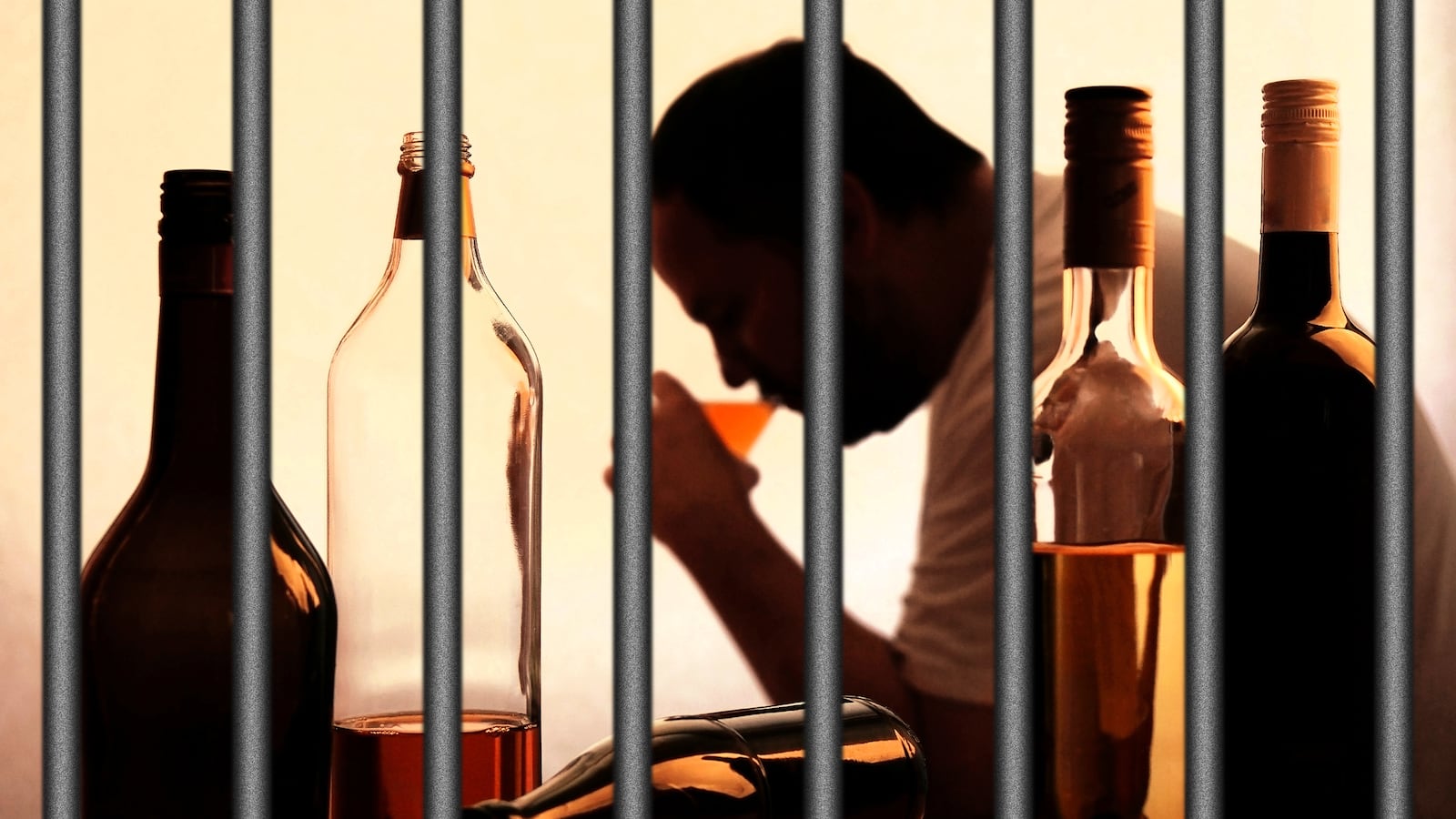Richard Starnes has been thrown in jail just for smelling like alcohol.
Every time Roanoke, Virginia, cops drive by they ask him, “You drinking?”
Starnes said usually the answer is yes, but there have been times when he’s sober and police lock him up anyway.
“They’ll say, ‘I smell alcohol on your breath.’ And I say ‘Give me a Breathalyzer’ and they won’t, and tell me ‘I’m taking you to jail anyway because I smell alcohol,” Starnes told The Daily Beast.
Starnes is one of thousands who say they’ve been put on a secret blacklist in Virginia that limits him from being even within smelling distance of an open container. It’s known as the Interdiction List, and as it says, anybody “shown himself to be a habitual drunkard” can be added to it by a prosecutor in a civil proceeding, often in absentia. Once people are on the list, they’re forbidden to possess, purchase, or consume alcohol. Starnes can’t even go into 7-Eleven without suspicion.
“My picture is in that book and I can’t buy beer and I can’t be around anybody who’s drinking,” he said.
The 50-year-old used to be homeless, spending empty-stomach nights under a pitched tent or a bridge. Thanks to the constant trips to the clink, he’s barely scratching by.
A new class-action lawsuit brought by the Charlottesville, Virginia-based Legal Aid Justice Center accuses Roanoke and four other cities of using the “habitual drunkard” law to sweep of the poor and indigent like Starnes off the streets.
“This is unconstitutional,” attorney Mary Frances Charlton of the Legal Aid Justice Center said. “It’s a civil court and yet a prosecutor can ask the local trial court to slap this label on an individual in the community. They don’t get a lawyer, they aren’t given the right to confront witnesses like they would in criminal court, and often they’re not even present.
“Once this label is slapped on them through civil proceedings any possession of alcohol is punished by up to a year in jail.”
She added that the framework of what a habitual drunkard is is purely arbitrary and that the punishments are meted out without any second thought.
“This is turning the jailhouse door into a revolving door.”
What’s more, people on the interdicted list are punished for the same crime more harshly. When most Virginias are caught with an open container, they’re given a citation and a $250 fine. But when an a person on the interdicted list is caught with a brown bag of hooch, the fine leaps up to $2,500 and the person can be jailed for up to one year for committing a Class 1 misdemeanor.
More than 600 people have been jailed under the statute in Virginia Beach since 2007 and at least 140 have been in Roanoke so far. Out of the 7,020 countable homeless in Virginia, the numbers of interdicted convictions over the past 10 years was 4,743.
Police departments and city attorneys did not respond to requests for comment.
The lawsuit cites the statute’s reliance on dated science and placating various homeless people who are being booked for their addiction and taken away in what seem like innocuous incidents: sitting near open containers and/or “having a detectable odor of alcohol on or near their person.” That means merely napping on a bench by a trashcan full of empties or taking cough medicine could be a crime.
Moreover, the homeless have some of the fewest of chances to seek treatment for what is often referred to clinically as chronic alcoholism and therefore there is “only a remote likelihood exists that a homeless alcoholic will achieve lasting sobriety… nevertheless police routinely arrest—and Commonwealth Attorneys often prosecute” them. The statute is used to repeatedly arrest and jail homeless alcoholics for possession of alcohol…[and] effectively criminalizes alcohol use disorder—or disease—for homeless individuals.”
Perhaps most frightening is how individuals are placed on the list in the first place.
According to the lawsuit, a civil proceeding transpires where a prosecutor can go before a judge and declare that John or Jane Doe is a “habitual drunkard/inebriate” and just like that he or she is blacklisted without due process.
The lawsuit suggests that “there is a strong liberty interest at stake” when hearings are held essentially in secret without a defendant or a legal attorney present to counter the alcohol aspersions.
Getting off the list is also shrouded in secrecy.
“They never said how I get off the list,” Starnes said. “I asked and they never gave me an honest answer.”
According to the civil lawsuit, “Virginia law provides no clear standards and procedures for removing the ‘habitual drunkard’ label under the Interdiction Statute.” That means that if your name is on the list for whatever reason it can be indelible. “Thus, once interdicted, a person often carries the label of ‘habitual drunkard’ for life.”
Not every person on the list is homeless or walking around with an open container. Some have been convicted of DUI offenses and part of their probation is to seek treatment and voluntarily agree to be put on the list for a matter of time.
Michael Buika is a student at Old Dominion University who agreed to be interdicted for five years after his second conviction for driving under the influence.
“I agreed to it because it was part of the plea bargain,” he told The Daily Beast. “They said I can’t be caught in possession or be caught purchasing it for five years.”
The 26-year-old student is taking his punishment and sobriety in stride.
“I don’t foresee myself being put in a predicament. I’m almost two years sober and I’m focused on finishing my bachelor’s degree.”
“This is only temporary.”
A woman who is a registered private nurse told us she was also given a pass to buy alcohol because “my patients require that so I have a stipulation,” she told us, also requesting her name be withheld.
A 27-year-old Virginia Beach native who was also interdicted after a DUI said he had been jailed for watching football at a bar because “I don’t have cable.”
After a fight spilled out to the sidewalk, the man, who wished to remain anonymous fearing reprisals, stepped out to watch the melee and was quizzed by cops. After scanning his ID, the cop said: “You’re interdicted. You’re not allowed to be here.”
“I said, ‘What does that mean?’”
The man had signed a form before being released from jail for DUI to be added to the interdicted list.
“They game me forms and I signed everything,” he put it simply. Since the bar incident, he’s paid a $2,500 fine and now has to go through a 12-week rehab program. Even after all that it’s uncertain if he will be removed from the list.
Another “habitual drunkard” is Roanoke-based Bryan Manning, who has had 30-some prosecutions for alcohol-related offenses. While shopping at a Walmart “store where alcohol was sold,” the lawsuit explains, the 49-year-old construction worker was approached by a cop who caught a whiff of his breath and claimed he’d been boozing (although Manning protested that he hadn’t consumed any alcohol). “He was nevertheless interdicted without being granted an attorney,” the court papers claim.
Manning has endured a great deal beyond just alcohol. Six of his family members have all committed suicide and he has been left by his wife after his drinking became too hard to kick.
“They [cops] say, ‘Hey you’re drinking. And they come up to me and start roughhousing,’” Manning told The Daily Beast. “I might be walking up the road with a couple beers or a 12-pack and they stop and pick me up and everything.”
The gotcha method has become too familiar for a man who believes he’s being wrongfully harassed by Roanoke cops.
“They know my name and stuff and they tell me, ‘You shouldn’t be getting beer, being homeless.’ It’s a big nightmare, OK.
“I’m so afraid to walk down the street and I really just want to be left alone.”
He’s also pleading for help rather than prison. “I tell them I’m suicidal and they only say, ‘We’re taking you to jail anyway.’”
There is a better way to deal with alcohol and alcoholism than using a law that dates back to 1873.
In 1994 a state task force set out to try to remedy Virginia’s public drunkard issues in a report entitled, The Impact of Public Inebriates on Community and Criminal Justice Services Systems. The report said while the costly practice of jailing the majority of “those arrested for public intoxication,” it is “not effective with the repeat offender.”
Instead, the task force suggested treatments and drunk tanks as more promising alternatives for this crisis.
“Public inebriate centers and social detoxification facilities are cost effective measures to divert public inebriates form Virginia’s jails.”
For unexplained reasons the statute remained and only added legal language effectively criminalizing public drunkenness as a misdemeanor.
The law is antiquated and a major abortion of justice, says Fredericksburg, Virginia-based attorney Andrew Flusche. He told The Daily Beast that branding American citizens as serial inebriates (especially in absentia) could set a slippery slope.
“Some people might accuse me of being Chicken Little,” he said. “We’re creating a class of alcohol-offenders.






